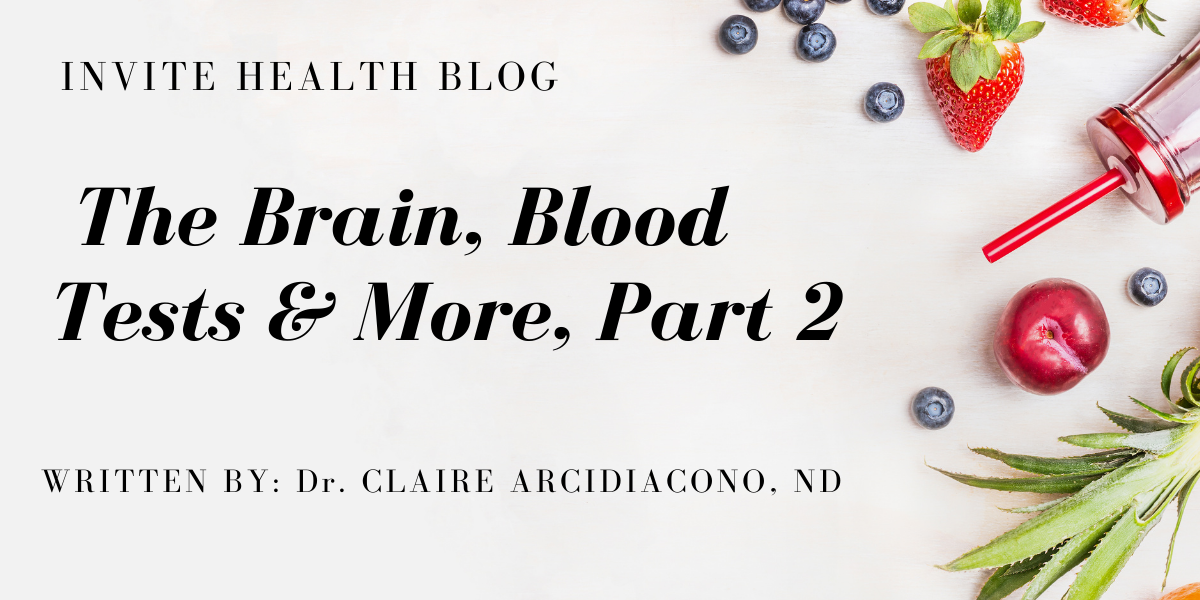Written by: Dr. Claire Arcidiacono, ND
For further questions or concerns email me at carcidiacono@invitehealth.com†

In our last blog we started our conversation regarding brain health talking about different conditions that you should rule out when experiencing memory changes. This week we will be delving into more neurologically based tests. Let’s start with recommended blood tests. When you visit your doctor, they may recommend some or all of the following tests. To start with a simple CBC or complete blood count. Included in a CBC is white blood cells, red blood cells, hemoglobin and hematocrit. The next test is a CMP or comprehensive metabolic panel. This panel includes sodium, glucose, bicarb, creatine, BUN, and liver function tests. As I mentioned in my prior blog thyroid hormones as well as certain vitamins may also be tested. † (1)
Depending on what the doctor suspects is causing the memory / brain changes they may also recommend what is called a cerebrospinal fluid exam. (Remember this? It is that fluid that is around your brain that brings nutrients and collects the brains waste!). The doctor will collect the cerebrospinal fluid by doing a lumbar puncture or spinal tap. This is possible since in addition to surrounding your brain the cerebrospinal fluid (CSF) also surrounds the spinal cord. Once the CSF has been collected a number of tests can be performed. CSF tests can be used to indicate if there is rapid injury to nerve cells in the brain. A CSF is highly recommended in all cases of rapidly progressive dementia. It is also suggested if Creutzfeldt-Jakob disease is suspected, by collecting CSF, it allows us to study brain markers from living humans. Current research has found certain CSF markers to be reliable in helping detect early Alzheimer disease. The more we study these markers the more we find markers associated with degenerative disease and thus we are able to diagnose these conditions earlier. † (2)
In addition to blood tests and CSF tests the doctor may recommend certain scans. I know that these tests can be intimidating. It is important to discuss any fears you may have. I know that some people are concerned with radiation, any dye that is used as well as suffering from claustrophobia induced anxiety. Feel free to call an Invite nutritionist to talk about your concerns. Anyhow on to the tests! The first test that the doctor may recommend for dementia is called a magnetic resonance imaging or MRI. An MRI produces images of the inside of the body using magnetic fields and radio waves rather than X-Rays. It is considered to be non-invasive. While an MRI can be done without contrast in some cases the doctor may recommend its use. For example, contrast can help with the visibility of tumors, inflammation and it can help us see the blood vessels better. An MRI can help your neurologist diagnose several different brain conditions. These include dementia, stroke, aneurysm, brain hemorrhages, infections, MS, cancers and traumatic brain injury. In summary an MRI can detect inflammation, swelling, structural issues, growths, fluid leaks, bleeding and any white matter disease. † (3)
ICYMI:THE BRAIN: BLOOD TESTS & MORE, PART 1>>READ NOW!
Another type of structural scan that the doctor may recommend is a computed tomography or CT scan. This is very similar to an MRI. However, it does involve x-rays unlike the MRI. Additionally, the image produced is not as clear as the image produced by an MRI. †
There are 3 types of functional (rather than structural) scans that your doctor may suggest. The first is a SPECT which shows how blood flows through the brain. A radioactive material is injected into a vein and then a scanner tract the material as it flows through the brain. When there is any disease in the brain there is usually less blood flow/ circulation.†
Now I know that I already spoke about the MRI but there is a special type of MRI called a functional MRI (fMRI). This is used to show any changes in circulation to the brain. It is performed in a similar way to a traditional MRI. †
Lastly your doctor may recommend a PET scan. What this scan looks for is how much energy is used by the brain. This is very similar to the SPECT scan in that it also uses a radioactive material that is “tracked” through the brain. This test can help detect such things Amyloid protein which is a sign of Alzheimer disease. † (2)
In addition to these tests, it is important for your doctor to do a complete history. This includes neuro-psychological testing. This is the most common screening tests and takes approximately 5 minutes. The abbreviated mental test score (AMTS) helps to detect possible dementia and includes 10 unique questions such as your address and date of birth. Another screening test is the mini cog which usually takes approximately 3 mins. A more sensitive screening test is known as the general practitioner assessment cognition (GPCOG). This involves an interview with both the patient and someone who knows the patient well. Lastly there is the Montreal cognitive assessment which consists of 30 questions takes approximately 10 minutes to complete. (4) In a 2021 study the MCA was found to be a better measure of cognitive function than the MMSE. † (5)
ICYMI:DAILY FOCUS & MEMORY SUPPORT JUST GOT EASIER, INVITE HEALTH PODCAST, EPISODE 648>>LISTEN NOW!
When seeking a consultation with an Invite nutritionist, it is important to bring a food log for 1 week including any liquids you consume. It is also important to include a list of any medications and supplements you are taking. †
Next week we will be starting more condition blogs and we will start off with one of the most common, which is dementia. †
REFERENCES
- https://memory.ucsf.edu/sites/memory.ucsf.edu/files/wysiwyg/UCSF%20Dementia%20Patient%20Guide_Dementia%20Evaluation%20Lab%20Testing_11-3-17.pdf
- https://memory.ucsf.edu/diagnosis
- https://my.clevelandclinic.org/health/diagnostics/22966-brain-mri
- https://www.medicalnewstoday.com/articles/cognitive-test-for-dementia
- https://bmcpsychiatry.biomedcentral.com/articles/10.1186/s12888-021-03495-6










